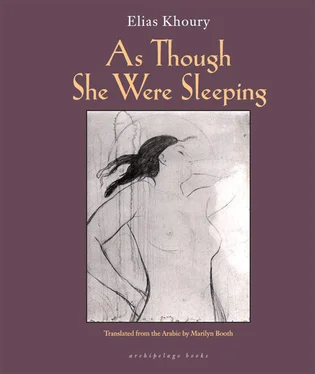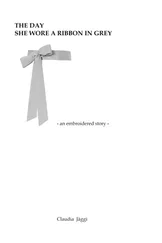Milia sobbed and swore on all the saints that nothing at all had happened. The mother screamed and wailed while the four brothers sat down around Milia in a half circle and began interrogating her. Musa was afraid and confused and perhaps embarrassed. Salim glowered while the faces of Niqula and Abdallah were bleached as white as chalk.
Milia did not say that she did not remember anything, because she remembered everything but she did not know what or how to tell.
Nothing happened, she said. She described how the doctor had massaged her leg while his brother stood behind her, holding her shoulders still.
And then? asked the mother.
And then nothing, said Milia.
How to explain this to them? This nothing had so many forms, to which she could not give names because she did not know the words to fit around them.
The problem is that the words are not right, she said to her husband, and said no more. She could not tell him that for her, words were nothing but wraps that hid things. When she listened to people (she could not say to him), she did not understand their words. She would think of the sounds and shapes words made instead of thinking about their meanings. As if the bodies of the words veiled the meanings.
Fine then — listen, he said.
No rebuke can you give to the yearner for yearning
If you knew not his depths as you know yours alone
For the slain one’s figure stained wet by flooding tears
Is no less than one stained by blood’s flow — his own
Do you love this poetry? Mansour asked. Why don’t you answer? She got up and went to bed. She closed her eyes and saw the two doctors, merging into one figure, one man with two heads; and the color white blanketed everything. Whiteness wrapped round the man with two heads as moans sounded through the parted lips of the girl seated under their hands and pain swelled from her leg to her spine.
When the family interrogations were over Musa sat down next to his sister on the sofa. Without a word he took her hand. Darkness spread through the large common dar . In the soft gloom the mother came, sat down beside her daughter, murmured words that Milia didn’t understand, ordered Musa to leave, and told the story.
It’s the nun’s fault, said Milia. She is the one who sent us to the doctor.
No, you are wrong, my girl. The nun warned me it could happen, and if it had not been for her, your brother Niqula would not have gone and saved you.
Saved me!
He certainly saved you. Death is preferable to scandal. What a scandal we could have been in!
But, Mama, they didn’t do anything. I told you what happened — nothing happened.
They didn’t because they couldn’t. My God, the story has come out and now they’re locked up for it. May the Almighty save us! This is a sign from the other world, my dear. If I didn’t have five children to worry about, I would have left this world for good by now and I would be long gone into the convent.
You’re always there, always at the convent, you practically live there already! I don’t know what you do over there, anyway. Anyway. Ala ayyi hal .
Milia went quiet though she did continue muttering under her breath. Ala ayyi hal — what does that mean — anyway? Hah, it doesn’t mean a thing. As if I didn’t tell my mother anything, as if she doesn’t ever talk to me. The story she told me about the doctor — fine, I heard it, and so what, I just said, Ala ayyi hal , and I shut my mouth. So that’s what life means: we just keep quiet, and we don’t understand anything — ala ayyi hal — but we act as if we do. So why even talk. So how am I supposed to believe what I hear.
How am I supposed to believe what I hear? she demanded in a louder voice. Her mother turned and asked her what she had said.
Nothing, Mama. Nothing at all. In any case. Ala ayyi hal .
When had this conversation taken place?
Was it after the family investigation had ended, when Saadeh sat down next to her daughter on the sofa? And told her the story of the two doctors? Or was it after that surprise that dropped out of the sky onto Milia and poisoned her spirit — when she learned that Najib was going to marry another woman?
It’s better this way. I knew that. Anyway, if he hadn’t left me I would have left him, she said, and reentered her dream. That day she summoned her dream promptly. She needed to see the birds die in the garden.
The smell of the two doctors hangs in her nose, following her all the way to this faraway town. She closes her eyes and sees her mother sitting next to her, telling her the story in a faint voice. Saadeh is yellow, reflecting the color of the curtains over the windows. The story is an amalgam of interwoven images.
Milia opened her eyes and sat up on the edge of the bed. Mansour was on the balcony, she felt vaguely sick. She did not want to see (even in her mind) the face of the man who massaged her leg, the sweat dripping from him as the sound of his panting rose.
The story goes that her leg slid beneath two bare hands thick with glistening black hairs. The oil was as transparent as water; the sweat beading along the doctor’s brow and over his face and neck spumed a strange odor into the room. The hand of the other man, the one who stood behind her, slid along her neck and crept to her cheeks.
Had that happened? Or had the scene planted itself in her memory because that was what her mother had told her? What had her mother told her? And was it true that the two men were all but married to the same woman? And that the police had arrested them because they gave their female patients drugs to put them to sleep and then violated them? What was this talk?
The story sticking in Milia’s memory is hazy and uncertain. It was said that the two doctors shared one house — and shared it with that woman. The short and somewhat weak-minded one was not really a doctor but rather served as a doctor’s aide to his taller and more robust brother. It was said that the real doctor had studied at the Université Saint-Joseph, specializing in bone surgery, but he refused to follow the European medical procedures and techniques that he had studied at the university. He preferred the traditional ways, and he treated his patients with olive oil plus various other oils that he extracted from wild plants. He rejected the use of plaster casts for setting fractures. He treated broken bones with his hands and with oil, binding them in heavy fabric. He argued that this was much to be preferred, because gypsum eroded the skin and could become worm-infested. He became the most famous bone doctor in Beirut, or this is what Sister Milana believed, anyway. No one raised questions about his perennial bachelorhood or his relationship with his brother’s wife until the two brothers were arrested on the heels of the Sayyida Marta incident. She was the wife of Khawaja Nazih Shamaat.
The story goes that Sayyida Marta visited the clinic of the two doctors for a shoulder fracture. She detected something odd about the practices there and then realized that the herbal tea the doctor’s wife had offered her in the waiting room tasted strange. She grew suspicious. When no one was there to see, she poured the hot liquid into a flowerpot. She entered the small close room of the piercing odors where the two doctors treated patients. She sat down and feigned sleep. When the massage began to take more circuitous paths, she cried scandal — and that was that. Once the word got out, people began to circulate endless tales about the two doctors and their common wife. No one questioned the validity of Sayyida Marta’s accusation. She was a respectable woman. Her husband, Nazih Shamaat, had a successful silk-export business in one of the small streets clustered around Beirut harbor. He was a city father and a member of the Greek Orthodox community council. Her word was not to be doubted.
Читать дальше












